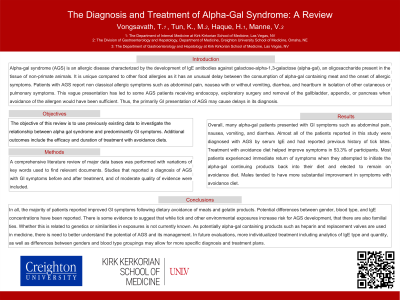Monday Poster Session
Category: Colon
P1949 - The Diagnosis and Treatment of Alpha-Gal Syndrome: A Review
Monday, October 28, 2024
10:30 AM - 4:00 PM ET
Location: Exhibit Hall E

Has Audio

Tahne Vongsavath, DO
Kirk Kirkorian School of Medicine
Las Vegas, NV
Presenting Author(s)
Tahne Vongsavath, DO1, Kyaw Min Tun, DO2, Lubaba Haque, DO1, Vignan Manne, MD1
1Kirk Kirkorian School of Medicine, Las Vegas, NV; 2Creighton University School of Medicine, Omaha, NE
Introduction: Alpha-gal syndrome (AGS) is an allergic disease characterized by the development of IgE antibodies against galactose-alpha-1,3-galactose (alpha-gal), an oligosaccharide present in the tissue of non-primate animals. It is unique compared to other food allergies as it has an unusual delay between the consumption of alpha-gal containing meat and the onset of allergic symptoms. Patients with AGS report non classical allergic symptoms such as abdominal pain, nausea with or without vomiting, diarrhea, and heartburn in isolation of other cutaneous or pulmonary symptoms. This vague presentation has led to some AGS patients receiving endoscopy, exploratory surgery and removal of the gallbladder, appendix, or pancreas when avoidance of the allergen would have been sufficient. Thus, the primarily GI presentation of AGS may cause delays in its diagnosis.
Methods: A comprehensive literature review of major data bases was performed with variations of key words used to find relevant documents. Studies that reported a diagnosis of AGS with GI symptoms before and after treatment, and of moderate quality of evidence were included.
Results: Overall, patients presented with GI symptoms such as abdominal pain, nausea, vomiting, and diarrhea. Almost all of the patients reported in this study were diagnosed with AGS by serum IgE and had reported previous history of tick bites. Treatment with avoidance diet helped improve symptoms in 53.3% of participants. Most patients experienced immediate return of symptoms when they attempted to initiate the alpha-gal continuing products back into their diet and elected to remain on avoidance diet.
Discussion: In all, the majority of patients reported improved GI symptoms following dietary avoidance of meats and gelatin products. Potential differences between gender, blood type, and IgE concentrations have been reported. There is some evidence to suggest that while tick and other environmental exposures increase risk for AGS development, that there are also familial ties. Whether this is related to genetics or similarities in exposures is not currently known. As potentially alpha-gal containing products such as heparin and replacement valves are used in medicine, there is need to better understand the potential of AGS and its management. In future evaluations, more individualized treatment including analytics of IgE type and quantity, as well as differences between genders and blood type groupings may allow for more specific diagnosis and treatment plans.
Disclosures:
Tahne Vongsavath, DO1, Kyaw Min Tun, DO2, Lubaba Haque, DO1, Vignan Manne, MD1. P1949 - The Diagnosis and Treatment of Alpha-Gal Syndrome: A Review, ACG 2024 Annual Scientific Meeting Abstracts. Philadelphia, PA: American College of Gastroenterology.
1Kirk Kirkorian School of Medicine, Las Vegas, NV; 2Creighton University School of Medicine, Omaha, NE
Introduction: Alpha-gal syndrome (AGS) is an allergic disease characterized by the development of IgE antibodies against galactose-alpha-1,3-galactose (alpha-gal), an oligosaccharide present in the tissue of non-primate animals. It is unique compared to other food allergies as it has an unusual delay between the consumption of alpha-gal containing meat and the onset of allergic symptoms. Patients with AGS report non classical allergic symptoms such as abdominal pain, nausea with or without vomiting, diarrhea, and heartburn in isolation of other cutaneous or pulmonary symptoms. This vague presentation has led to some AGS patients receiving endoscopy, exploratory surgery and removal of the gallbladder, appendix, or pancreas when avoidance of the allergen would have been sufficient. Thus, the primarily GI presentation of AGS may cause delays in its diagnosis.
Methods: A comprehensive literature review of major data bases was performed with variations of key words used to find relevant documents. Studies that reported a diagnosis of AGS with GI symptoms before and after treatment, and of moderate quality of evidence were included.
Results: Overall, patients presented with GI symptoms such as abdominal pain, nausea, vomiting, and diarrhea. Almost all of the patients reported in this study were diagnosed with AGS by serum IgE and had reported previous history of tick bites. Treatment with avoidance diet helped improve symptoms in 53.3% of participants. Most patients experienced immediate return of symptoms when they attempted to initiate the alpha-gal continuing products back into their diet and elected to remain on avoidance diet.
Discussion: In all, the majority of patients reported improved GI symptoms following dietary avoidance of meats and gelatin products. Potential differences between gender, blood type, and IgE concentrations have been reported. There is some evidence to suggest that while tick and other environmental exposures increase risk for AGS development, that there are also familial ties. Whether this is related to genetics or similarities in exposures is not currently known. As potentially alpha-gal containing products such as heparin and replacement valves are used in medicine, there is need to better understand the potential of AGS and its management. In future evaluations, more individualized treatment including analytics of IgE type and quantity, as well as differences between genders and blood type groupings may allow for more specific diagnosis and treatment plans.
Disclosures:
Tahne Vongsavath indicated no relevant financial relationships.
Kyaw Min Tun indicated no relevant financial relationships.
Lubaba Haque indicated no relevant financial relationships.
Vignan Manne indicated no relevant financial relationships.
Tahne Vongsavath, DO1, Kyaw Min Tun, DO2, Lubaba Haque, DO1, Vignan Manne, MD1. P1949 - The Diagnosis and Treatment of Alpha-Gal Syndrome: A Review, ACG 2024 Annual Scientific Meeting Abstracts. Philadelphia, PA: American College of Gastroenterology.
